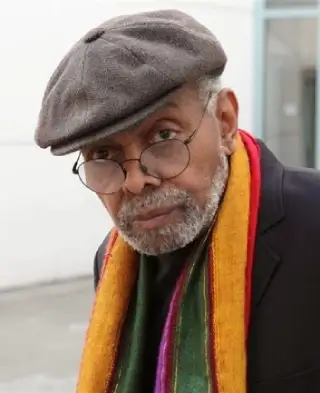Biography of Amiri Baraka

| date | place | |
|---|---|---|
| born | October 07, 1934 | Newark, New Jersey, U.S. |
| died | January 09, 2014 | Newark, New Jersey, U.S. |
Amiri Baraka was born Everett Leroy Jones on October 7, 1934, in Newark, New Jersey. He grew up in a working-class family, which shaped his understanding of social issues and racial dynamics from an early age. Baraka attended Rutgers University, where he began to hone his literary talents. He later transferred to Howard University, a historically Black university, earning a degree in English in 1954. His time at Howard exposed him to a rich tapestry of African American culture and literature. After college, Baraka served in the U.S. Air Force for three years. However, his military career ended with a dishonorable discharge due to accusations of being a communist sympathizer —a n experience that would further fuel his political activism. Following his service, he moved to Greenwich Village in New York City, where he became immersed in the vibrant cultural scene of the Beat Generation. It was during this period that he adopted the pen name LeRoi Jones and began publishing poetry that reflected his growing disillusionment with American society. Baraka's literary career took off with the publication of his first major poetry collection, Preface to a Twenty Volume Suicide Note, in 1961. This work marked the beginning of his exploration into themes of despair and existential angst. However, as the civil rights movement gained momentum, Baraka's focus shifted toward racial identity and social justice. In 1965, following the assassination of Malcolm X, Baraka founded the Black Arts Repertory Theatre/School in Harlem. This initiative aimed to provide a platform for Black artists to create works that spoke authentically to their experiences and struggles. His play Dutchman (1964) became one of his most significant contributions to American theater, winning an Obie Award for its powerful portrayal of racial tensions and identity conflicts. As he embraced Black nationalism, Baraka changed his name to Amiri Baraka and began to explore more radical themes in his work. His poetry became increasingly confrontational and politically charged, addressing systemic racism and advocating for Black empowerment. Notable collections from this period include Black Magic (1969) and It's Nation Time (1970), which further established him as a leading voice in the Black Arts Movement. Throughout the late 1960s and into the 1970s, Baraka's ideology evolved as he delved deeper into Marxism and Islamic thought after converting to Islam. His writings during this time reflected a commitment to revolutionary ideals and critiques of capitalism. However, some of his works also sparked significant controversy; for example, his poem "Somebody Blew Up America?" faced backlash for its perceived anti-Semitic sentiments after its publication in 2001. In 2002, Baraka was appointed New Jersey's poet laureate but was dismissed from the position shortly thereafter due to public outcry over the aforementioned poem. Despite these controversies, Baraka remained unapologetic about his views and continued to advocate for social change through his art. In addition to his prolific writing career—spanning over 50 books that include poetry, essays, plays, and music criticism—Baraka was also a dedicated educator. He taught at various institutions throughout his life, including Stony Brook University in New York, where he served as professor emeritus of Africana Studies until his retirement. Baraka's legacy is multifaceted; he is celebrated as a pioneering figure in the Black Arts Movement and as an influential voice for marginalized communities. His works continue to resonate with readers today, offering profound insights into race relations and social justice issues in America. Amiri Baraka passed away on January 9, 2014, leaving behind a rich literary heritage that challenges readers to confront uncomfortable truths about society while celebrating the resilience and creativity of African American culture. His impact on literature and activism remains significant, inspiring future generations of writers and activists alike. Amiri Baraka's poetry is a powerful reflection of his commitment to social justice and the African American experience, making him a pivotal figure in the landscape of American literature. His works, particularly during the 1960s and 1970s, embody the spirit of the Black Arts Movement, advocating for a distinct Black identity and artistic expression. In poems like "Black Art," Baraka calls for Black artists to reject imitation of white cultural norms and instead embrace their unique perspectives. This poem serves as a manifesto for artistic empowerment, urging the Black community to harness their creativity as a means of resistance against systemic oppression. Baraka's use of vivid imagery and provocative language captures the anger and frustration stemming from years of racial injustice, positioning his poetry as a vehicle for transformation and empowerment within the African American community. Throughout his career, Baraka's poetry evolved significantly, reflecting his ideological shifts from Beat influences to Black nationalism and Marxism. His later works, such as "Somebody Blew Up America?" challenge conventional narratives surrounding American identity and critique the systemic racism embedded in society. This poem, written in response to the September 11 attacks, employs sarcasm and rhetorical questions to highlight America's historical failures toward its Black citizens. Baraka's unapologetic approach often ignited controversy, yet it underscored his belief that poetry should serve as a catalyst for social change. By exploring themes of race, identity, and justice, Amiri Baraka's poems remain essential reading for those seeking to understand the complexities of race relations in America and the power of art as a form of resistance.
Feel free to be first to leave comment.